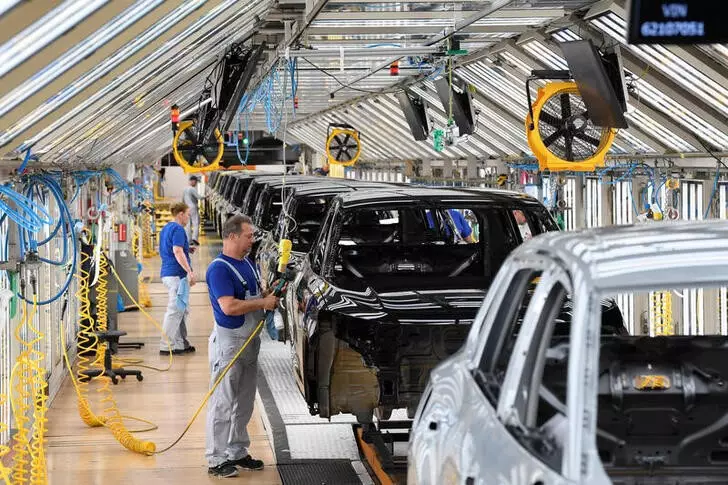Volkswagen, one of Europe’s most iconic automotive manufacturers, finds itself at a critical crossroads. As the company contemplates the closure of factories in Germany for the first time, it faces unprecedented pressure from competitive Asian rivals, particularly in the electric vehicle (EV) sector. This contemplation is not merely a reflection of market trends but a significant shift in how the automotive giant is responding to a rapidly evolving industry landscape. The leadership of CEO Oliver Blume, characterized as a consensus builder in contrast to his predecessor Herbert Diess’s more confrontational style, is now under scrutiny, especially regarding the relationship with powerful labor unions.
Recent reports reveal that Volkswagen’s works council has expressed strong opposition to these potential closures, indicating that at least one large vehicle plant and a component factory are considered outdated. Unions, particularly IG Metall, play a crucial role within this environment, with their influence persisting even through leadership transitions. As the works council prepares for a meeting with company executives, expectations surrounding management’s approach to negotiations remain tense. Blume’s entry into these discussions could signify a pivotal moment in labor relations at Volkswagen, emphasizing the need for compromise in this challenging climate.
In light of a challenging economic environment characterized by rising costs and intensified competition, Volkswagen’s current predicament highlights the need for decisive action. The company’s CFO Arno Antlitz is expected to announce strategies aimed at addressing the organization’s financial burdens during the upcoming works council meeting, implying that drastic measures are on the horizon. The implemented job security program, a staple at Volkswagen for nearly three decades, is now under threat, signaling a dramatic shift in company policies as it faces a downturn in profitability.
Analysts have pointed out the plants in Osnabrueck and Dresden as potential candidates for closure, even as the carmaker grapples with maintaining its substantial employee base of approximately 680,000. The dual challenges of transitioning to electric mobility and coping with lost market share—particularly to aggressive competitors like BYD in China—have compounded its difficulties. Despite these adversities, it’s noteworthy that Volkswagen’s shares experienced a slight uptick following the news of the reviews, reflecting investor optimism—a rare silver lining in a sea of uncertainty.
Volkswagen’s considerations regarding factory closures may profoundly affect the dynamics of labor relations in Germany. Traditionally, the cooperative spirit between unions and management has been a hallmark of German industrial relations, but current circumstances may threaten this fragile balance. With IG Metall already voicing its concerns regarding the management’s past decisions—including a lack of investment in hybrid technologies and affordable electric vehicles—the discontent is palpable.
The leadership acknowledges the need for internal reform to tackle issues effectively. Daniela Cavallo, the works council head, has highlighted the management’s series of missteps, underlining the importance of strategic investment over hasty plant closures. Her remarks indicate a call for reducing operational complexity within the Volkswagen structure and utilizing synergies across its various subsidiaries rather than resorting to drastic measures that may destabilize the organization.
The potential shutdown of Volkswagen plants carries significant implications not only for the company but for the wider German economy as well. As the country’s largest industrial employer, Volkswagen’s actions will undoubtedly reverberate throughout the local and national economic framework. The economic ministry’s response underscores the gravity of the situation, suggesting that Volkswagen must navigate this issue responsibly in the context of broader economic health.
Prominent economists, like Carsten Brzeski of ING Research, view the company’s potential decisions as a call to action for German policymakers. The shifting economic conditions and competitive pressures necessitate a reassessment of government strategies aimed at bolstering the industrial sector. As regional elections reveal rising discontent among voters, particularly in the automotive heartlands, greater attention to economic revitalization is essential. This shift may well become an impetus for lawmakers to prioritize sustainability and innovation within the automotive industry, thus redefining Germany’s place in the global market.
Volkswagen’s contemplation of factory closures marks a pivotal moment not only for the company itself but also for the broader automotive industry and the German economy. As it struggles to realign itself with the demands of a changing global market, the strategies adopted now—either through workforce adjustments or technological investments—will define its trajectory for years to come. This critical juncture calls for a delicate balancing act between maintaining employment and fostering innovation, both of which are essential for Volkswagen’s future success amid fierce global competition. The decisions made will resonate far beyond the factory floor, shaping the narrative of an entire industry navigating the complexities of modern technological advancement.

